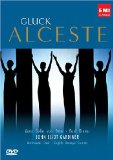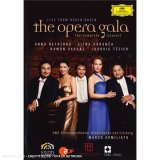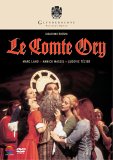![La Boheme [2008]](/pictures/1087638.jpg) La Boheme | DVD | (15/09/2008)
from £14.25
| Saving you £-2.26 (N/A%)
| RRP
La Boheme | DVD | (15/09/2008)
from £14.25
| Saving you £-2.26 (N/A%)
| RRP Angela Gheorghiu leads a magnificent cast in Franco Zeffirelli's iconic production of Puccini's La Boh''me - filmed live at the Metropolitan Opera in Hi-Definition. This grand sumptuous production of Puccini's timeless masterpiece is brought to you on DVD by EMI Classics continuing its collaboration with the Metropolitan Opera and its hugely successful Metropolitan Opera : Live in High-Definition series. La Boh''me set in Paris around 1830 depicts a society fraught with conflict. Amid the turmoil it is the love that blossoms between two young artists in a time that appears both bleak and turbulent that makes this story so very special. Mim'' and Rodolfo sung by Angela Gheorghiu and Ram''n Vargas respectively charm as the young couple that fall in love while Marcello and Musetta are sung by Ludovic Tezier and Ainhoa Arteta. Gheorghiu the leading Puccini soprano of our time reprises the role of Mim'' at the MET for the first time in twelve years. She sings the role with the beauty and perfection that is expected by an artist of her great stature and experience. Following its debut at the Metropolitan Opera in 1981 Franco Zeffirelli's stunning production is as loved and as magnificent today as the day it was first staged over 27 years ago. This live broadcast is therefore the 347th time Zeffirelli's Boh''me has been performed making this the most performed production in the MET's history. Only the hardest of hearts will remain untouched by this passionate and unforgettable story depicting the joys and sorrows of love and loss.
 Gluck - Alceste (Gardiner, Monteverdi Choir) | DVD | (24/11/2008)
from £N/A
| Saving you £N/A (N/A%)
| RRP
Gluck - Alceste (Gardiner, Monteverdi Choir) | DVD | (24/11/2008)
from £N/A
| Saving you £N/A (N/A%)
| RRP When the historic Theatre du Chatelet in Paris re-opened after a period of extensive refurbishment the first two productions mounted in the theatre were Gluck''s Alceste and Orph''e et Eurydice. Both operas were sung in their French versions and were mounted and designed by Robert Wilson and conducted by John Eliot Gardiner. This was the first time Wilson and Gardiner had collaborated and their individual credentials combined to produce an exceptional result. American polymath Wilson was responsible for some of the most ambitious avant-garde performance projects of the 1970s and 80s.Since the mid-1980s he has increasingly brought his prodigious creativity to works fiom the standard dramatic and operatic repertoire transforming them into his own unmistakably minimalist yet grandiose visions. His styled classical interpretations of Alceste and Orph''e bear his trademarks of an uncluttered stage and the arresting use of colour and light. They are not so much timeless as in Robert Wilson''s words ''full of time''. With their minutely rehearsed gestures at once formal and poetic the singers have the grace and elegance of Balanchine or Martha Graham dancers. A key figure in the revival of Early Music John Eliot Gardiner has long been a champion of Gluck''s French operas and is a great Gluck conductor. He received enormous critical acclaim for his musical direction of both Orph''e and Alceste at the Chatelet as did his orchestras and chorus. He sought to rid the operas of any vestiges of remoteness or venerable respectability and to release the huge emotional charge that lies behind the beauty of Gluck''s classical sobriety. The stories are after all he says not only poignant and deeply moving they have an immediate and contemporary relevance: they portray two married couples striving to protect their union and their love plumbing the very depths of their emotional strength and summoning the courage to make huge personal sacrifices. ''If presented in a way that''s immediate and with tremendous intensity and truth of expression then all the dross and superficiality of the stage action falls away and you''re left with what''s actually a very visceral connection between two living people.'' Television''s top opera director Brian Large worked closely with Robert Wilson and John Eliot Gardiner to ensure that the translation of live performance to the small screen is of the highest artistic and techcal standard. John Eliot Gardiner chose Gluck''s 1776 French version of Alceste for Robert Wilson''s production conducting the piece for the first time with his period-instrument ensemble the English Baroque Soloists. The excellent Monteverdi Choir provides the chorus and unusually they sing fiom the pit with dancers taking their place on stage. They give magnificently persuasive expression to the horror and compassion demanded by the drama. The 'Greek geometric perfection of Robert Wilson''s various tableaux is beautifully realised with his eye for striking theatrical symbol creating an intriguing visual arena for one of Gluck''s most elevated and sublime works. Soprano Anne Sofie von Otter one of the finest singers of her generation takes the title role of Alceste Queen of Thessaly who offers to die at the hands of the gods in place of her husband Admete (Paul Groves) so that the people will not lose their king. To universal astonishment she is saved from the Underworld by Hercule (Dietrich Henschel) whose action is sanctioned by Apollon (Ludovic T''zier) in a dramatic deus ex machina.
 The Opera Gala - Live From Baden-Baden | DVD | (22/10/2007)
from £14.28
| Saving you £2.71 (18.98%)
| RRP
The Opera Gala - Live From Baden-Baden | DVD | (22/10/2007)
from £14.28
| Saving you £2.71 (18.98%)
| RRP The new faces of opera present opera favourites in a glamorous live concert recording: Anna Netrebko El'na Garan''a Ram''n Vargas and the highly acclaimed young French baritone Ludovic T''zier sing a wide range of Italian and French opera arias. This recording features highlights from three gala concerts (28 & 31 July 3 August 2007) at Baden-Baden's Festspielhaus - surely the hottest event of the summer!
![Verdi: La Traviata (Aix-en-Provence, 2011) [DVD]](/pictures/1114677.jpg) Verdi: La Traviata (Aix-en-Provence, 2011) | DVD | (12/03/2012)
from £N/A
| Saving you £N/A (N/A%)
| RRP
Verdi: La Traviata (Aix-en-Provence, 2011) | DVD | (12/03/2012)
from £N/A
| Saving you £N/A (N/A%)
| RRP Natalie Dessay made her first European appearances as Violetta in La traviata in a new production by the French director Jean-Franois Sivadier at the 2011 Aix-en-Provence Festival. This DVD captures her intense performance in the company of American tenor Charles Castronovo as Alfredo and French baritone Ludovic Tzier as his father, Giorgio Germont. Her theatrical impact is devastating, wrote the Financial Times. With this new production of La traviata at the 2011 Aix-en-Provence Festival, Natalie Dessay made her first European appearances as Verdi's Violetta, a pinnacle of the soprano repertoire. She made her debut in the role in 2009 at the Santa Fe Festival in the US, and subsequently sang Violetta in Japan. Dessay's 2011-12 season will include La traviata at the Vienna State Opera (in this Aix-en-Provence production by French theatre and opera director Jean-Franois Sivadier) and the New York Metropolitan. Violetta makes tremendous demands on a singer, both vocally and dramatically, and signals Dessay's transition from lighter coloratura roles to the more full-blooded lyric repertoire. I'm tired of playing weeping girls, she told the French magazine Tl 7 Jours, Violetta is a real woman. That makes a nice change! The change was clearly successfully achieved: describing Dessay’s performance, the Financial Times wrote that her theatrical impact is devastating. Sivadier's production was staged in the open air, in Aix-en-Provence's exquisite Thtre de l'Archevch with its huge spiral staircases, medieval arches and 18th-century wings. The stage dcor was minimal, the simple costumes evoked the 1940s or 1950s, and the prime focus was on intense characterisation.
![Gluck - Alceste / Robert Wilson, John Eliot Gardiner, Théâtre du Châtelet [1999]](/pictures/1028730.jpg) Gluck - Alceste / Robert Wilson, John Eliot Gardiner, Théâtre du Châtelet | DVD | (16/09/2015)
from £14.98
| Saving you £10.01 (66.82%)
| RRP
Gluck - Alceste / Robert Wilson, John Eliot Gardiner, Théâtre du Châtelet | DVD | (16/09/2015)
from £14.98
| Saving you £10.01 (66.82%)
| RRP Rebelling against the increasingly formulaic operas of the time, Christoph Willibald Gluck's "reformist" opera Alceste (1767) was a successful attempt to return to a purer form of musical drama. It is highly appropriate that this 1999 production of the revised 1776 Paris version should be conducted by Sir John Eliot Gardiner, with the English Baroque Soloists and Monteverdi Choir, the same forces responsible for many fine Bach performances equally emphasising character and text. In setting the tragic story of the profound love between Queen Alceste and her husband King Admète, Gluck provided a score of austere, rending beauty. Principals Anne-Sofie Von Otter and Paul Groves dominate the production as much through the power of their acting as their musical prowess, the major scenes being electrifying in their emotional intensity. Contrasting with this psychological realism are the simple, Greek-inspired designs by Robert Wilson. Silhouetted geometric shapes glide gracefully through the slow-motion movements of the actors, bringing a hypnotic, dreamlike quality to the work. Near constant blue lighting adds a sense of late evening tranquillity, giving the stage a highly distinctive look and a feeling of dislocation in space and time. Both chilling and uplifting, this Alceste is a triumph. On the DVD: There are no special features other than a well-appointed booklet. The Dolby Digital 5.1 sound effectively re-creates a wide theatrical atmosphere and given the low lighting levels throughout, the anamorphically enhanced 16:9 picture makes the most of the striking imagery. The disc is encoded for regions 2 and 5. --Gary S Dalkin
![The Opera Gala [Blu-ray]](/pictures/1089311.jpg) The Opera Gala | Blu Ray | (20/10/2008)
from £25.95
| Saving you £-3.96 (N/A%)
| RRP
The Opera Gala | Blu Ray | (20/10/2008)
from £25.95
| Saving you £-3.96 (N/A%)
| RRP Anna Netrebko, Elina Garanca, Ramon Vargas and Ludovic Tezier as well as the SWR Sinfonieorchester Baden-Baden und Freiburg, perform works by various composers, conducted by Marco Armiliato.
![Donizetti: Lucie de Lammermoor - Lyon National Opera [2002]](/pictures/1028262.jpg) Donizetti: Lucie de Lammermoor - Lyon National Opera | DVD | (15/12/2003)
from £N/A
| Saving you £N/A (N/A%)
| RRP
Donizetti: Lucie de Lammermoor - Lyon National Opera | DVD | (15/12/2003)
from £N/A
| Saving you £N/A (N/A%)
| RRP Based on one of Walter Scott's most melodramatic novels, what is arguably Donizetti's best tragic opera is here presented in its French version, Lucie de Lammermoor. The hapless Lucia (Patrizia Ciofi) tries to refuse the marriage to a minister that will rescue her family's fortunes in favour of her beloved, the family's worst enemy Edgard (Roberto Alagna). Predictably this all ends in many deaths and the audience's tears. Evelina Pido and the Orchestre Nationale de Lyon tear through the fairly unsubtle score with considerable brio and they and the cast are admirable in the opera's quieter more thoughtful moments--the famous Act Two sextet and Lucia's mad scene, in which Ciofi is solidly excellent rather than deeply memorable. Alagna turns in his usual high-gloss performance as Edgard and manages to make his final aria more moving than the quality of the piece deserves. This is an idiomatic and effective performance in a solid made-for-TV production, albeit one that never comes across as notably original. On the DVD: Lucie de Lammermoor is presented on disc in 16:9 ration with Dolby Digital 5.1, DTS or LPCM stereo sound options. It has subtitles in English, German, French, Spanish and Italian. --Roz Kaveney
![Tchaikovsky-Pique Dam [2007]](/pictures/1075457.jpg) Tchaikovsky-Pique Dam | DVD | (27/08/2007)
from £N/A
| Saving you £N/A (N/A%)
| RRP
Tchaikovsky-Pique Dam | DVD | (27/08/2007)
from £N/A
| Saving you £N/A (N/A%)
| RRP 'Pyotr Ilyich Tchaikovsky - Pikovaya Dama' 'Pique Dame - The Queen Of Spades - La Dame de Pique'
 Le Comte Ory - Glyndebourne Festival Opera | DVD | (27/06/2005)
from £N/A
| Saving you £N/A (N/A%)
| RRP
Le Comte Ory - Glyndebourne Festival Opera | DVD | (27/06/2005)
from £N/A
| Saving you £N/A (N/A%)
| RRP Set in rural France at the time of the crusades Rossini's last comic opera is the saucy tale of Le Comte Ory and his pursuit of the crusaders' wives who chastely await the return of their menfolk. This acclaimed production was recorded at Glyndebourne during the 1997 season with the delectable French soprano Annick Masis as Adele the Belgian tenor Marc Laho as the lecherous Comte Ory and Diana Montague as the amorous page Isolier. Jerome Savary's sparkling production includes a sensuous bathing scene and a riotous banquet with the male singer disguised as nuns. Andrew Davis conducts the London Philharmonic.
![Mozart: Le Nozze Di Figaro (Teatro Real: TR97001BD) [Blu-ray] [2011][Region Free]](/pictures/1130915.jpg) Mozart: Le Nozze Di Figaro (Teatro Real: TR97001BD) | Blu Ray | (31/01/2012)
from £32.38
| Saving you £-2.39 (N/A%)
| RRP
Mozart: Le Nozze Di Figaro (Teatro Real: TR97001BD) | Blu Ray | (31/01/2012)
from £32.38
| Saving you £-2.39 (N/A%)
| RRP From the opening notes of the overture to the final curtain, Emilio Sagi's classic, triumphant production fully brings to life all the elegant wit and theatricality of Mozarts comic masterpiece. Leading baritone Ludovic T�zier shines as the lustful Count Almaviva who attempts to obtain the favours of Figaros bride-to-be, Susanna (Isabel Rey), while Luca Pisaroni gives a feisty performance as Figaro. Conductor Jes�s L�pez Cobos masterfully captures the enchanting score. A witty yet profound ta...
![Tchaikovsky: Pique Dame [Blu-ray] [2011] [2010]](/pictures/1138967.jpg) Tchaikovsky: Pique Dame | Blu Ray | (31/05/2011)
from £25.65
| Saving you £4.34 (16.92%)
| RRP
Tchaikovsky: Pique Dame | Blu Ray | (31/05/2011)
from £25.65
| Saving you £4.34 (16.92%)
| RRP Pique Dame
![Mozart: Le Nozze Di Figaro (Teatro Real: TR97002DVD) [2011]](/pictures/1131183.jpg) Mozart: Le Nozze Di Figaro (Teatro Real: TR97002DVD) | DVD | (31/01/2012)
from £N/A
| Saving you £N/A (N/A%)
| RRP
Mozart: Le Nozze Di Figaro (Teatro Real: TR97002DVD) | DVD | (31/01/2012)
from £N/A
| Saving you £N/A (N/A%)
| RRP From the opening notes of the overture to the final curtain, Emilio Sagis classic, triumphant production fully brings to life all the elegant wit and theatricality of Mozarts comic masterpiece. Leading baritone Ludovic T�zier shines as the lustful Count Almaviva who attempts to obtain the favours of Figaros bride-to-be, Susanna (Isabel Rey), while Luca Pisaroni gives a feisty performance as Figaro. Conductor Jes�s L�pez Cobos masterfully captures the enchanting score. A witty yet profound tal...

Please wait. Loading...
This site uses cookies.
More details in our privacy policy